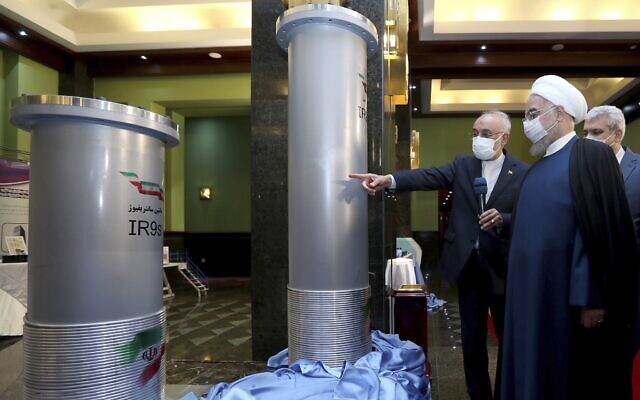US secretary of state admits he’s unsure if Tehran is interested in rejoining pact; IAEA chief adds to skepticism, saying ‘space narrowing’ for a temporary deal.
US Secretary of State Antony Blinken warned Monday that the “breakout time” Iran needs to assemble an atomic bomb could be reduced to just weeks, if Tehran keeps violating the 2015 accord limiting its nuclear program.
Testifying before the House Foreign Affairs Committee on the Biden administration’s budget for the fiscal year of 2021, Blinken admitted that it is unclear if Iran is “willing and prepared” to come back into compliance with the agreement, as talks continue for the United States to rejoin the deal.
“Meanwhile, its program is galloping forward… The longer this goes on, the more the breakout time gets down… it’s now down, by public reports, to a few months at best. And if this continues, it will get down to a matter of weeks,” he lamented.
Former US president Donald Trump pulled out of the Iran nuclear deal in 2018, claiming that it did not do enough to prevent the Islamic republic from building a nuclear weapon.
Trump tightened sanctions on Tehran, and the Iranian authorities responded by loosening restrictions on their nuclear program imposed by the deal.
US President Joe Biden has said that he would rejoin the agreement if Iran returns to compliance with its caps. Washington says it plans to negotiate a “longer and stronger” subsequent deal once the sides have reentered the Joint Comprehensive Plan of Action.
The two sides have been negotiating in Vienna since April through their partners in the multilateral agreement — Britain, China, France, Germany and Russia.
The talks are scheduled to resume later this week in the Austrian capital.
“We’re not even at the stage of returning to compliance for compliance,” Blinken said Monday. “We don’t know if that’s actually going to happen.”
“There are multiple egregious activities that Iran is engaged in… Each and every one would be even worse if Iran had a nuclear weapon or was on the threshold of being able to have one,” Blinken said, pushing back against claims by Republicans that Iran’s behavior in the region should lead the US to end nuclear deal reentry talks.
‘Space is narrowing’ for temporary nuclear deal — IAEA chief
Earlier Monday, the UN nuclear watchdog’s head said it was “becoming increasingly difficult” to extend a temporary inspections arrangement with Iran, as Tehran and world powers try to salvage the nuclear deal.
In February, Tehran suspended some IAEA inspections, leading the agency to strike a temporary three-month deal allowing it to continue its activities despite the reduced level of access.
“I can see this space narrowing down,” International Atomic Energy Agency Director General Rafael Grossi told journalists in Vienna, at the beginning of the quarterly meeting of the IAEA’s board of governors.
In late May, the ad hoc arrangement was extended until June 24, with Grossi describing the remaining time as “very short.”
Grossi said he hoped that by “wider general agreement that’s being worked on downtown or by some other means, we are not going to see our… inspection capacities curtailed any more.”
“We cannot limit and continue to curtail the ability of the inspectors to inspect and at the same time pretend that there is trust,” he said.
He also referred to a long-running attempt by the IAEA to get clarity on several undeclared Iranian sites where nuclear activity may have taken place, mostly in the early 2000s.
In April the IAEA launched a new process of “technical discussions” with Iran in an effort to “break the impasse” over the sites.
But a report issued last week made clear that the IAEA’s queries had not been resolved.
Grossi said Monday that his “expectations were not met” and that there had been no “concrete progress” on the issue, despite the Iranian authorities’ stated willingness to cooperate.
“Talk must lead to conclusions,” he said.
(Times of Israel).
